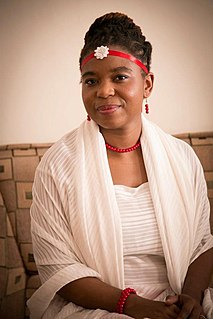A Quote by Grace Lee Boggs
Finding the leaders of the future is a question of recognizing those people who give leadership in a crisis.
Quote Topics
Related Quotes
People look at the future and see a black hole. They look at climate change and see an ecological crisis. They look at their leaders corrupted by money and see a political crisis. They wonder if they'll ever be able to pay off their student loan or own a house. Given this ecological, political and financial crisis, what they want is a different future. Their fundamental demand is a different regime to provide that future.
In every crisis, people do not respond like a school of fish. Some people become immobilized. Some people become very angry, some commit suicide, and other people begin to find solutions. And visionary organizers look at those people, recognize them and encourage them, and they become leaders of the future.
In addition to all of the ratios and goals and parameters and bottom lines, it is fundamental that leaders endorse a concept of persons. This begins with an understanding of the diversity of people's gifts and talents and skills. Recognizing diversity gives us the chance to provide meaning, fulfillment and purpose, which are not to be relegated solely to private life any more than such things as love, beauty and joy. The art of leadership lies in polishing and liberating and enabling those gifts.
We need to do what I call visionary organizing. Recognize that in every crisis, people do not respond like a school of fish. Some people become immobilized. Some people become very angry, some commit suicide, and other people begin to find solutions. And visionary organizers look at those people, recognize them and encourage them, and they become leaders of the future.
It is tempting to call for better leadership, but we probably expect too much from the leaders of the nations. Those nations are too big, the connections not strong enough, the commitment to the future not long enough. It is better to look smaller, to our now-smaller organisations, to local communities and cities, to families and clusters of friends, to small networks of portfolio people with time to give to something bigger than themselves. We have to fashion our own directions in our own places.
In the earlier days of history, kings and leaders went to the battlefield with their men; but today, those who determine that a nation will go to war remain safely behind. The next time leaders talk of warring, all the people should get together and send those leaders to the front lines. Give them a big arena with wonderfully effective ammunition, and the war will be finished in a day
More and more, leadership, whether it's profit or nonprofit, is about recruiting and keeping talented people. That's the biggest challenge. Yes, you've got to create systems that will enable people easily to innovate continuously; you've got to be a system-builder. But finding and keeping geeks and shrinks is the biggest challenge. That means leaders have got to be salespeople, they've got to be recruiters, and they've got to be actively able to understand and keep the talent they have. Leadership is courtship. That's what it's becoming.
































